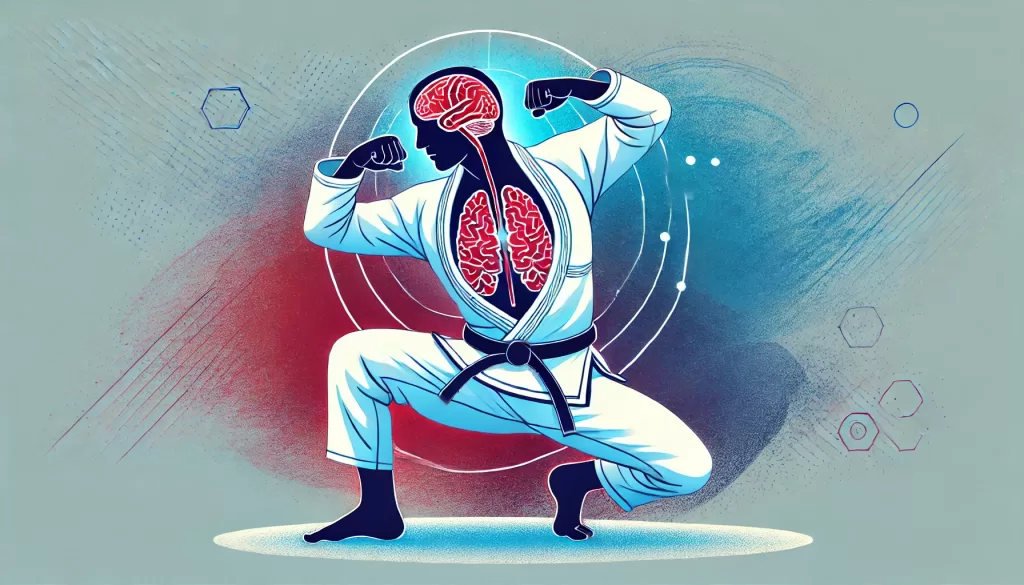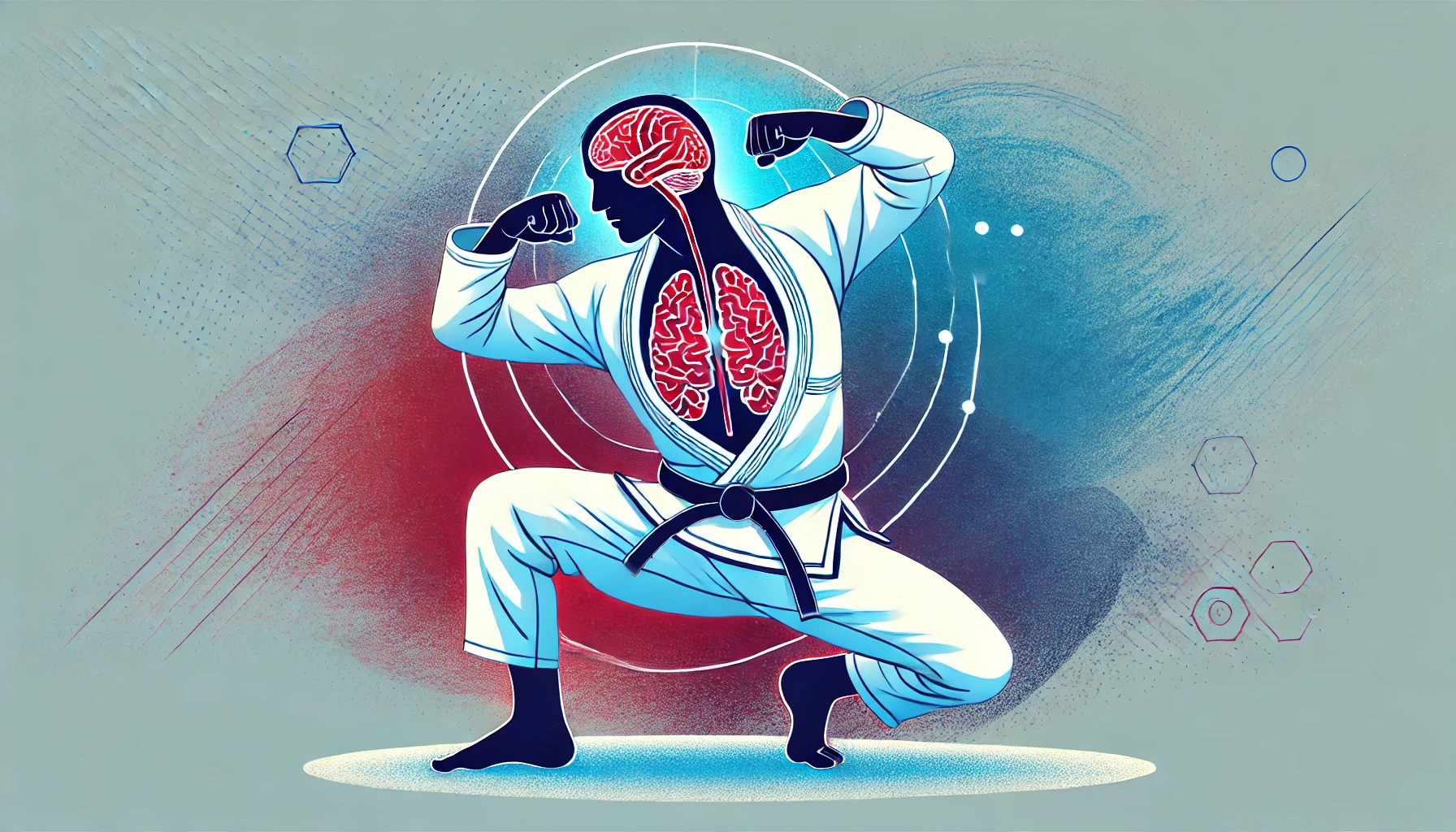Have you ever wondered how Brazilian Jiu-Jitsu can help not only your body but also your mind? In this post, we will explore how Jiu-Jitsu affects your brain and helps with mental health and thinking skills. By understanding the science behind Jiu-Jitsu, you will see why so many people find it a life-changing activity for both their body and mind. Jiu-Jitsu is not just about becoming physically stronger; it is also about developing a stronger mind, improving focus, reducing stress, and creating deeper connections with others. Whether you are new to martial arts or a seasoned athlete, the mental benefits of Jiu-Jitsu are profound.

1. Reducing Stress and Building Emotional Strength
One of the most significant benefits of Brazilian Jiu-Jitsu (BJJ) is its ability to reduce stress and build emotional strength. Studies show that practicing Jiu-Jitsu helps people deal with stress better and feel more emotionally stable. For veterans and first responders, BJJ has been shown to help them become more resilient and connect better with others. The combination of tough physical exercise and community support provides an effective outlet for stress, helping practitioners develop ways to cope with challenges, both during training and in daily life. BJJ encourages practitioners to confront difficult situations on the mat, which helps them deal with stress more effectively in their everyday lives. This process of facing physical challenges helps people learn to stay calm under pressure and respond efficiently, no matter the obstacles they face (The Sport Journal).
Another aspect that contributes to stress reduction is the sense of mindfulness naturally developed through practice. When sparring or drilling techniques, you must be fully present in the moment. This focus on the present helps quiet the mind and reduce worries about the past or future. This form of active meditation helps practitioners feel less overwhelmed and more in control of their emotions, which is incredibly beneficial for mental health. The camaraderie built during training also creates an environment where practitioners can share their struggles and feel supported, adding another layer of stress relief.
2. Improving Your Thinking Skills
If you want to sharpen your mind, training in BJJ might be perfect for you. Jiu-Jitsu requires you to focus, recognize patterns, and make quick decisions. Research by the International Brazilian Jiu-Jitsu Federation shows that regular training can help you improve your attention span, solve problems better, and think more clearly. This is because, during training, you have to adapt quickly and make decisions on the spot, which helps your brain get better at processing information. Unlike other forms of exercise that may be repetitive, BJJ is highly dynamic, with each roll presenting a new puzzle to solve. This constant mental stimulation trains your brain to stay alert, analyze situations, and come up with effective solutions quickly (IBJJF).
Another reason why BJJ improves thinking skills is the need to anticipate your opponent’s moves. Jiu-Jitsu is often referred to as a “physical chess game,” where practitioners must think several steps ahead and create strategies to outmaneuver their partners. This aspect of prediction and strategy requires a great deal of mental effort and helps sharpen cognitive skills. Over time, this type of mental exercise contributes to improved memory, better focus, and enhanced problem-solving abilities.
Additionally, learning new techniques and memorizing different sequences of movements helps improve memory and mental flexibility. The variety of positions and submissions requires practitioners to learn and remember a wide range of techniques, keeping their brains active and engaged. This continual learning process enhances neuroplasticity—the brain’s ability to adapt and change—which is crucial for maintaining cognitive function as we age.
3. Protecting Your Brain Health
Besides helping you think better, Jiu-Jitsu might also help protect your brain. A study from the University of South Wales found that people who practice BJJ have better blood flow to the brain and maintain sharper thinking skills compared to those who don’t practice. This means that regular Jiu-Jitsu training might protect against losing brain function as you get older, potentially reducing the risk of diseases like Alzheimer’s. The physical activity involved in BJJ promotes cardiovascular health, which is closely linked to brain health. Better blood flow means that the brain receives more oxygen and nutrients, which are essential for maintaining cognitive function (University of South Wales).
Regular exercise like BJJ also stimulates the release of growth factors—chemicals that promote the health of brain cells and support the growth of new blood vessels in the brain. These growth factors help protect the brain from the effects of aging, making it more resilient to cognitive decline. Practicing Jiu-Jitsu also involves a high level of coordination, which helps strengthen connections between different parts of the brain. This coordination and motor skill development keep the brain sharp and agile, making it easier to maintain mental clarity as you age.
4. Social Connection and Mental Well-being
Jiu-Jitsu is not only about physical training—it’s also about connecting with others. The training environment helps people build strong friendships, which are very important for good mental health. Studies show that practicing Jiu-Jitsu can give people a sense of belonging and make them feel more connected. The community aspect of Jiu-Jitsu classes gives people a support system that helps them feel less lonely and more accomplished. Training partners often become close friends, and the bonds formed on the mat can provide emotional support during tough times (Academia.edu).
For many people, social isolation can lead to feelings of depression and anxiety. Jiu-Jitsu provides an opportunity to connect with others in a meaningful way. The act of working together to learn techniques, helping each other improve, and sharing the experience of training creates a deep sense of camaraderie. This community aspect is one of the reasons why Jiu-Jitsu is often seen as more than just a sport—it becomes a lifestyle. Practitioners support each other both on and off the mat, creating friendships that last beyond the gym. These social connections are a key part of why Jiu-Jitsu is so effective at improving mental health.
5. Feel-Good Chemicals: Endorphins, Adrenaline, and Dopamine
When you train Jiu-Jitsu, your body releases chemicals that make you feel good. Endorphins, which are natural painkillers, help reduce stress and make you feel happy. You also get a boost of adrenaline and dopamine during training, which gives you excitement and a sense of satisfaction after a tough session. These chemicals are the reason why many people find Jiu-Jitsu addictive in a healthy way. After training, people often feel happier, less anxious, and more positive overall. The rush of endorphins helps create a “runner’s high,” a feeling of euphoria that leaves practitioners feeling amazing after class.
Adrenaline, released during intense rolls or competitions, gives you the energy and focus needed to perform well under pressure. It also helps you build confidence, as you learn to stay calm and composed during challenging situations. Dopamine, the “reward chemical,” is released when you achieve something challenging—like successfully completing a technique or defending against a tough opponent. This dopamine boost reinforces the behavior, making you want to come back for more and keep improving.
The combination of these chemicals contributes to improved mood, better sleep, and reduced symptoms of anxiety and depression. Many practitioners find that regular Jiu-Jitsu training helps them manage their mental health more effectively, providing a natural way to cope with life’s challenges. The positive impact on mental health is one of the main reasons why Jiu-Jitsu is not just a physical practice but also a powerful tool for overall well-being.
Conclusion
Brazilian Jiu-Jitsu is more than just a physical workout—it’s a way to improve both your mind and body. From reducing stress and building emotional strength to boosting brain health and creating social connections, the neuroscience of Jiu-Jitsu shows why it’s such a powerful practice for feeling better in all areas of life. Practicing Jiu-Jitsu helps you develop mindfulness, build stronger relationships, and protect your brain from the effects of aging. If you want to improve your mental health, feel less stressed, or sharpen your thinking skills, try stepping onto the mat and see how Jiu-Jitsu can help you.
Want to learn more or try a class? Contact us today and start your journey into the world of Brazilian Jiu-Jitsu—a place where both your mind and body can grow stronger together. Whether you are looking to relieve stress, meet new people, or challenge your mind, Jiu-Jitsu offers something for everyone. Come experience the benefits for yourself and discover how Jiu-Jitsu can transform your life.
Transform Your Life with Jiu Jitsu


Leave a Reply